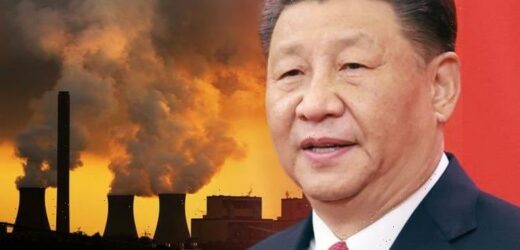China: Sam Armstrong reveals ‘risk’ of strategic dependency
We use your sign-up to provide content in ways you’ve consented to and to improve our understanding of you. This may include adverts from us and 3rd parties based on our understanding. You can unsubscribe at any time. More info
Scenes of chaos unfolded across the nation in the past week, triggered by motorists flocking to petrol stations en masse. Questions about the number of HGV drivers in the UK have sparked a wave of panic buying, reminiscent of Britons raiding supermarkets during Covid lockdowns. Experts, however, have argued the situation is nothing compared to China’s energy shortages, which have affected as many as 20 provinces in the past month.
A crackdown on greenhouse emissions, the rising price of coal and increased demand for energy have led to one of the nation’s biggest energy crises yet.
China’s industrial hubs, in particular, have borne the brunt of the outages, with officials in Guangdong province urging businesses to limit their power usage.
Sudden power cuts and energy rationing have affected homes, businesses and factories, including manufacturers supplying tech giants Apple and Tesla.
According to Ron Bousso, a Reuters writer who specialises in the oil and gas industries, the situation threatens to spill over into the rest of the global economy.


Economists have already slashed their forecasts for China’s economic growth this year, with experts at Goldman Sachs predicting a fall from 8.2 percent down to 7.8 percent on Tuesday.
Hui Shan, chief China economist, said: “Recent cuts to production in a range of high-energy-intensity industries add to the already significant downside pressure in the growth outlook.”
In a note published this week, the Wall Street bank’s analysts said there is “considerable uncertainty” heading into the fourth quarter.
International tech powers like Tesla rely on Chinese manufacturers for many key technologies and parts, which means their supply lines could be disrupted as a result.
Steve Baker says China 'isn't ready to do deal at COP26'
Mr Bousso tweeted on Tuesday: “Forget the UK’s fuel shortages, the #China energy crisis is shaping up to be a massive global economic event – Goldman downgraded China’s GDP forecast for 2021 to 7.8 percent from 8.2 percent due to energy costs #OOTT #ChinaEnergyCrunch”
In a follow-up tweet, he said: “And now Citi has trimmed its #China growth forecast for next year to 4.9 percent from 5.5 percent, citing spillover from the woes of embattled property giant Evergrande, and predicted policy makers would deliver more interest rate reduction. #OOTT”
The grim outlook was shared by Ambrose Evans-Pritchard, the International Business Editor of The Telegraph, who warned this week China’s energy crisis “will rock the whole world”.
He wrote: “China’s energy crunch is happening for much the same reasons as in Europe.


“Covid upset the rhythms of the global fuel market.
“The weather was extreme: drought hit hydro-power, and the hot summer boosted air conditioning.
“The result was an explosion in demand for coal and gas.”
About 56 percent of the Chinese economy is powered by coal and the country is the world’s leading consumer of the fossil fuel.
China is, however, a signatory to the Paris Climate Agreement and that means it has committed to reducing its greenhouse emissions.
President Xi Jinping has announced the country will transition to a net-zero economy by the year 2060.
Speaking at the UN General Assembly in New York last year, he said: “We aim to have CO2 emissions peak before 2030 and achieve carbon neutrality before 2060.”
Earlier this year, it was estimated China alone accounted for about 27 percent of the world’s greenhouse emissions.
Source: Read Full Article


